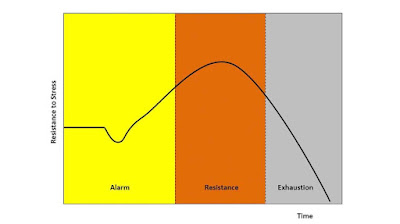GAS
GENERAL ADAPTATION SYNDROME
GAS, General Adaptation Syndrome, was created by a Hungarian medical doctor and researcher, Hans Selye. In Montreal University, during an experiment with lab rats, he discovered some psychological changes after submitting the rats in stressful events. After some in-depth researches, he established three different stages for the stress: Alarm, Resistance and Exhaustion.
At the first stage, Alarm, your body reacts as if you were in a dangerous scenario, your adrenal gland releases cortisol, your body's main stress hormone. It prepares you for the "fight-or-flight" response, the reaction that occurs in response to an adverse event. The second stage, Resistance, your body still aware of some kind of attack that may occur, then cortisol continues to be released and your blood pressure remains elevated. Your body starts to adapt and learn how to live in this situation. But, if it continues too long of a period, you start to show some symptoms, like irritability and poor concentration. After a long period of time, the third stage appears, the exhaustion. At the last stage, your body does not have more energy to fight. You may give up or feel your situation is hopeless. Some symptoms that may appear are depression and anxiety.
It is important to be aware of your stress level. Your body could work well and productive in the second stage but after prolonged stress, your yield decrease and you put yourself at risk for health. You should make pauses during the work to meditate, listen to some music and relax. Otherwise, you may not live long.
References:
- Selye H. The Stress of Life (rev.edn.). New York: McGraw-Hill, 1976.


First off, I want to thank you for your blog. I thought your comment on Puga's blog was very nice. I like the pick jar theory, as I had this demonstrated to me in university. I am happy that at least one student talked about GAS. I was not too familiar with the inverted U theory, so that was a good read too.
ReplyDelete